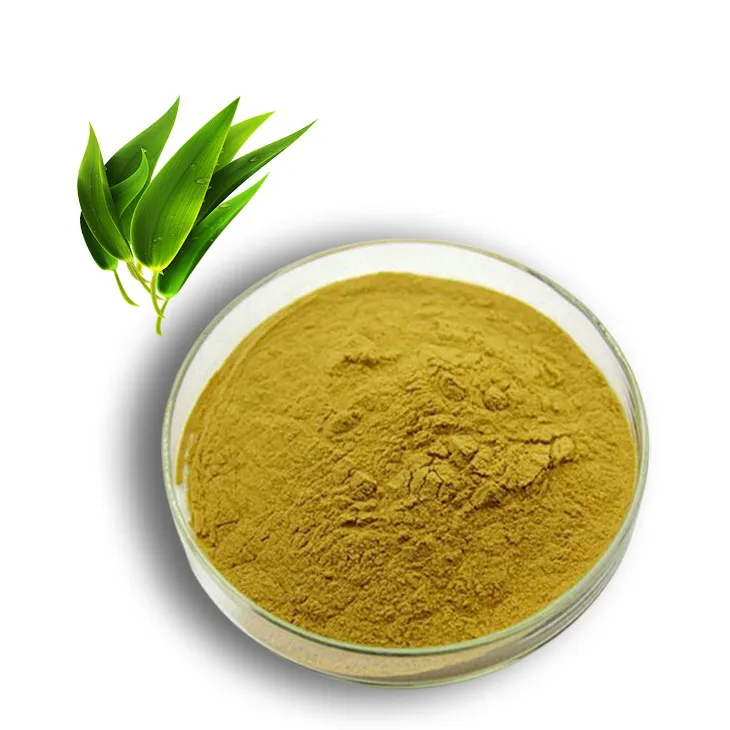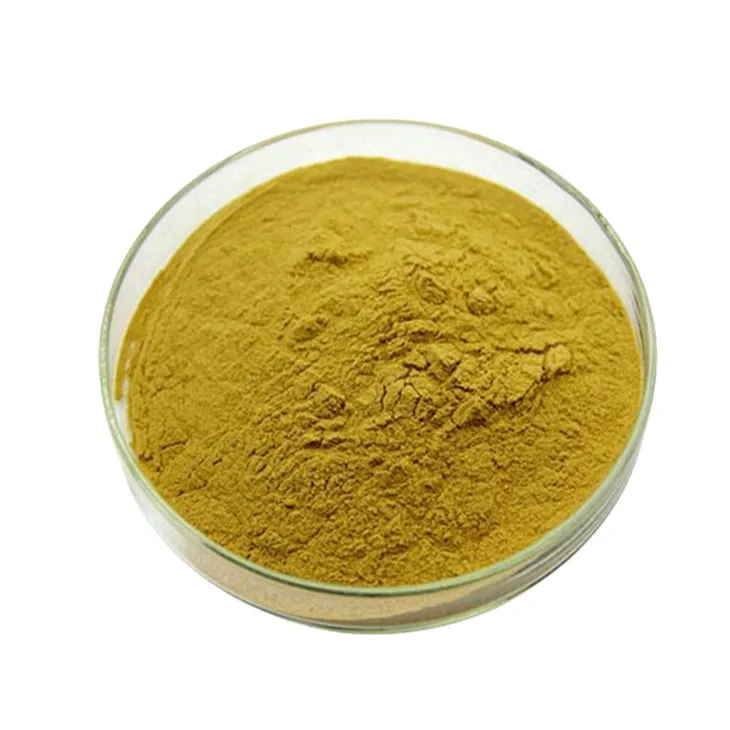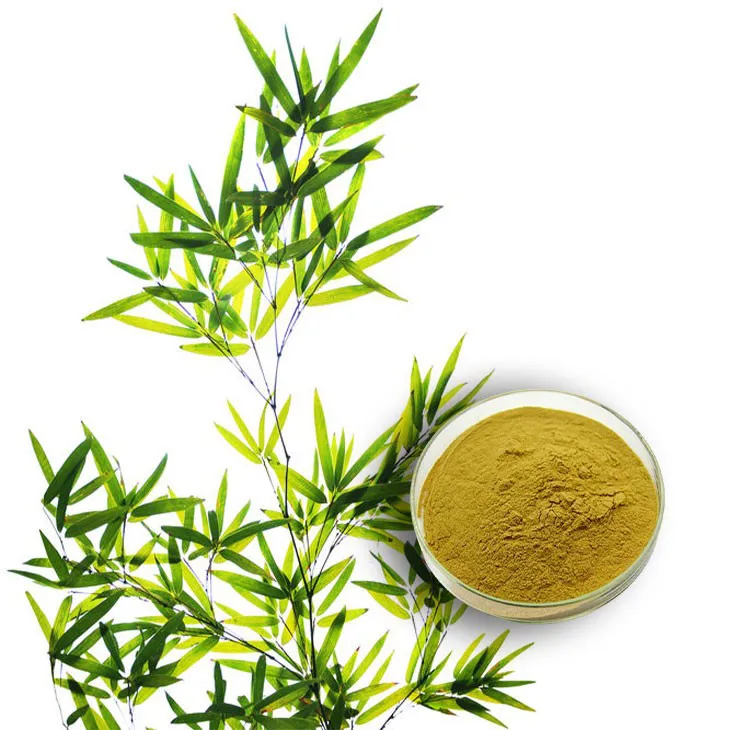- 0086-571-85302990
- sales@greenskybio.com
Chinese Bamboo Leaf Extract Powder Manufacturers.
2024-11-28

1. Introduction to China's Advantage in Bamboo Resources
China is a leading force in the production of Bamboo Leaf extract powder. One of the key factors contributing to this leadership is China's abundant bamboo resources. China has a vast expanse of areas filled with bamboo. These bamboo - rich regions are spread across different geographical areas in the country, providing a stable and high - quality raw material source for Bamboo Leaf extract powder manufacturers.
The large - scale presence of bamboo in China is not only a natural heritage but also a significant economic asset. Bamboo is a fast - growing plant, which means that it can be harvested sustainably. This sustainable availability of bamboo ensures that manufacturers do not face shortages of raw materials. Moreover, different species of bamboo are found in China, each potentially offering unique properties for extraction.

2. Advanced Extraction and Processing Technologies
Chinese Bamboo Leaf extract powder manufacturers are equipped with advanced extraction and processing technologies. Supercritical fluid extraction is one of the modern methods used. In this process, a supercritical fluid, often carbon dioxide, is used as a solvent. The supercritical state of the fluid has unique properties that allow for efficient extraction of bioactive compounds from bamboo leaves. It has the advantage of being a relatively clean process, as it leaves little to no residue compared to traditional solvents.
Another important technology is ultrasonic - assisted extraction. Ultrasonic waves are applied during the extraction process. These waves create cavitation bubbles in the extraction solvent, which help in breaking down the cell walls of the bamboo leaves more effectively. This results in a more efficient release of the desired compounds such as flavonoids, phenolic acids, and polysaccharides. The use of these advanced technologies ensures that the bamboo leaf extract powder produced is of high - purity and high - quality.

3. Rich Bioactive Compounds in Bamboo Leaf Extract Powder
The bamboo leaf extract powder produced in China is rich in bioactive compounds. Flavonoids are one of the major components. Flavonoids are known for their antioxidant properties. They can scavenge free radicals in the body, which are often associated with various diseases and the aging process. For example, in the context of the food industry, the antioxidant property of flavonoids can help in preserving food by preventing lipid peroxidation.
Phenolic acids are also present in significant amounts. These compounds have anti - inflammatory effects. In the pharmaceutical industry, phenolic acids can be used in the development of drugs for treating inflammatory diseases. In addition, they can also contribute to the overall antioxidant capacity of the extract powder.
Polysaccharides are another important group of bioactive compounds in bamboo leaf extract powder. Polysaccharides have been shown to have immunomodulatory effects. In the cosmetic industry, they can be used in products to improve skin health by enhancing the skin's immune function. Overall, these bioactive compounds give the bamboo leaf extract powder various health - promoting properties such as antioxidant, anti - inflammatory, and antimicrobial effects.

4. Strict Quality Control Standards
Chinese manufacturers adhere to strict quality control standards. They follow international and domestic quality regulations throughout the production process. Raw material selection is the first step where strict criteria are applied. Only high - quality bamboo leaves are selected for extraction. This involves inspection for any signs of disease, damage, or contamination.
During the extraction process, quality control measures are continuously implemented. Parameters such as extraction time, temperature, and pressure are carefully monitored to ensure consistent product quality. In the final product packaging, strict hygiene and safety standards are followed. The packaging materials are selected to protect the bamboo leaf extract powder from moisture, light, and other environmental factors that could degrade its quality.
These strict quality control standards ensure that the bamboo leaf extract powder they produce can meet the diverse needs of different industries. In the pharmaceutical industry, the powder needs to meet high - purity and safety requirements for use in drug formulations. In the food industry, it must comply with food safety regulations and have a consistent flavor and quality. In the cosmetic industry, it should be of a suitable quality for use in skincare and haircare products.

5. Meeting the Needs of Different Industries
5.1 Pharmaceutical Industry
In the pharmaceutical industry, bamboo leaf extract powder has great potential. The bioactive compounds present in the powder can be used in the development of new drugs. For example, the antioxidant and anti - inflammatory properties of the compounds can be harnessed for treating various diseases. The strict quality control measures implemented by Chinese manufacturers ensure that the extract powder is suitable for pharmaceutical applications. It can be used in the formulation of tablets, capsules, or syrups after further processing.
5.2 Food Industry
The food industry is another major consumer of bamboo leaf extract powder. It can be used as a natural food additive. For instance, the antioxidant property of the powder can be used to extend the shelf - life of food products. It can also be added to functional foods such as health drinks or energy bars. Chinese manufacturers ensure that the powder meets all the necessary food safety regulations. This includes compliance with limits on heavy metals, pesticides, and microbial contamination.
5.3 Cosmetic Industry
Bamboo leaf extract powder is increasingly being used in the cosmetic industry. The bioactive compounds in the powder can have beneficial effects on the skin. For example, the polysaccharides can improve skin hydration and elasticity. The antioxidant and anti - inflammatory properties can also help in reducing skin aging and treating skin disorders. Chinese manufacturers produce high - quality extract powder that can be incorporated into various cosmetic products such as creams, lotions, and serums.
6. Future Prospects of Chinese Bamboo Leaf Extract Powder Manufacturers
The future looks promising for Chinese bamboo leaf extract powder manufacturers. With the increasing global demand for natural and healthy products, the demand for bamboo leaf extract powder is likely to grow. The manufacturers can further explore new markets and applications for their products.
Research and development efforts can be intensified to discover more bioactive compounds and their potential uses. For example, more in - depth studies on the immunomodulatory effects of the polysaccharides can lead to new applications in the pharmaceutical and health - care sectors. Moreover, by continuously improving their extraction and processing technologies, manufacturers can enhance the quality and yield of the extract powder.
However, they also face some challenges. One of the challenges is competition from other natural extract manufacturers. To stay competitive, they need to focus on product differentiation through quality improvement and innovation. Another challenge is the need to comply with ever - changing international quality and regulatory standards. Overall, with the right strategies, Chinese bamboo leaf extract powder manufacturers can continue to thrive in the global market.
FAQ:
What are the main extraction methods used by Chinese bamboo leaf extract powder manufacturers?
Chinese bamboo leaf extract powder manufacturers use modern extraction methods such as supercritical fluid extraction and ultrasonic - assisted extraction. These methods can ensure the production of high - purity and high - quality bamboo leaf extract powder.
What are the bioactive compounds in bamboo leaf extract powder?
The bamboo leaf extract powder is rich in bioactive compounds like flavonoids, phenolic acids, and polysaccharides.
How do Chinese manufacturers ensure the quality of bamboo leaf extract powder?
Chinese manufacturers adhere to strict quality control standards. They follow international and domestic quality regulations throughout the production process, from raw material selection to the final product packaging.
What industries can use bamboo leaf extract powder?
The bamboo leaf extract powder can meet the diverse needs of different industries, including the pharmaceutical, food, and cosmetic industries.
What is the advantage of China in the production of bamboo leaf extract powder?
China has a vast expanse of bamboo - filled areas, which provide a stable and high - quality raw material source for bamboo leaf extract powder manufacturers. Also, they are equipped with advanced extraction and processing technologies.
Related literature
- Study on the Bioactive Compounds of Bamboo Leaf Extract"
- "Quality Control in the Production of Bamboo Leaf Extract Powder"
- "Bamboo Resources and Their Utilization in Extract Production"
- ▶ Hesperidin
- ▶ citrus bioflavonoids
- ▶ plant extract
- ▶ lycopene
- ▶ Diosmin
- ▶ Grape seed extract
- ▶ Sea buckthorn Juice Powder
- ▶ Beetroot powder
- ▶ Hops Extract
- ▶ Artichoke Extract
- ▶ Reishi mushroom extract
- ▶ Astaxanthin
- ▶ Green Tea Extract
- ▶ Curcumin Extract
- ▶ Horse Chestnut Extract
- ▶ Other Problems
- ▶ Boswellia Serrata Extract
- ▶ Resveratrol Extract
- ▶ Marigold Extract
- ▶ Grape Leaf Extract
- ▶ blog3
- ▶ blog4
-
D - Mannose Manufacturer
2024-11-28
-
The best organic chia seed powder.
2024-11-28
-
The extraction process of Maca extract.
2024-11-28
-
Organic Motherwort Extract Powder Supplier.
2024-11-28
-
The Pure Vitamin K2 Most Worth Buying.
2024-11-28
-
Horse Chestnut Extract
2024-11-28
-
Dan Shen Root Extract/Salvia Root Extract
2024-11-28
-
Centella Asiatica Extract
2024-11-28
-
Almond Extract Powder
2024-11-28
-
Elderberry Extract
2024-11-28
-
Lemon Balm Extract
2024-11-28
-
Red Wine Extract
2024-11-28
-
Mango flavored powder
2024-11-28
-
Beetroot juice Powder
2024-11-28
-
Coix Seed Extract
2024-11-28





















